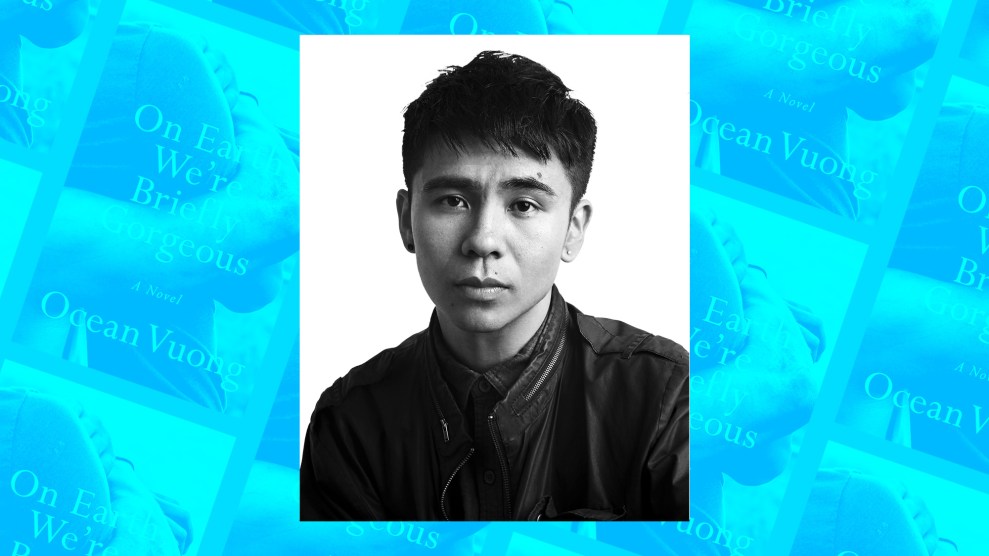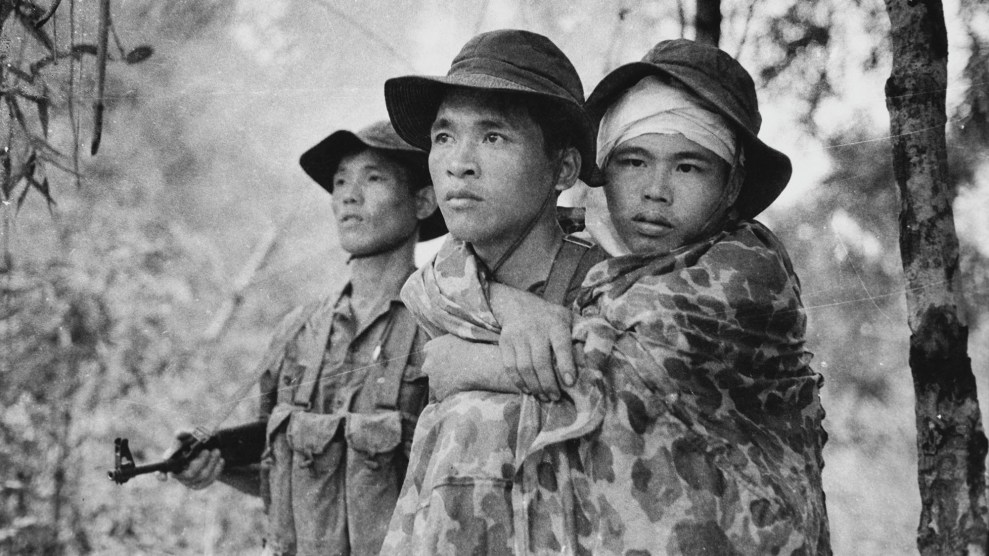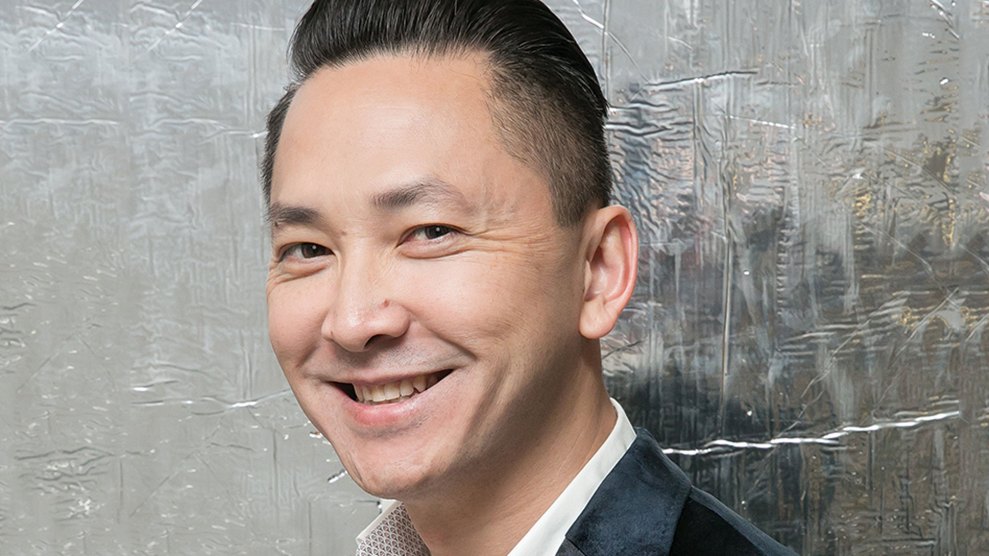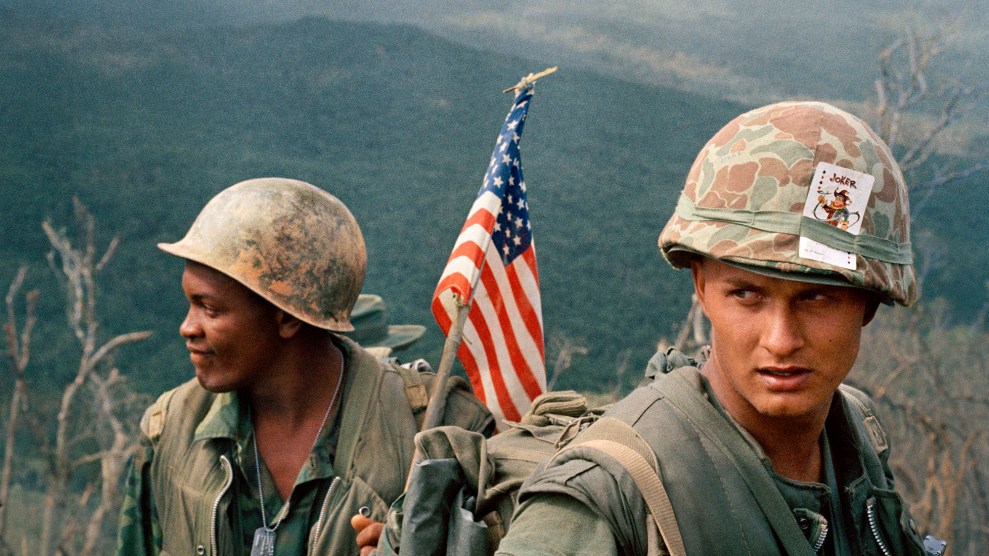
Tom Hines
Ocean Vuong’s first act of writing, as he describes it, was an act of preservation.
When his grandmother died in 2008, he felt a “sudden panic.” “I’m the only one that can write in the family,” he tells me, “so if I don’t write down her stories, they’ll be gone.”
Vuong began penning the poems and folk songs she would share with him. “Soon after, I started to write my own poems alongside hers,” he says. “It was very piecemeal. There was not a sweeping moment where I knew I would be a writer; I wish it happened like that. It was much more cumbersome.”
Themes of preservation, family, and reckoning with a violent, traumatic history reverberate throughout Vuong’s work as a poet and writer. Vuong was raised by his grandmother, mother, and aunt—all Vietnamese refugees—in Hartford, Connecticut, and was the first in his family to go to college. He attended business school, thinking that he would, as he tells me, do what many first-generation immigrants do: make money and get his family out of the projects. Maybe later, he thought, he’d pursue his dream of becoming a writer. Instead, he dropped out after three weeks and found himself reading his writing at open mics in New York and later studying literature at Brooklyn College in 2008. His first collection of poetry, Night Sky with Exit Wounds, was published in 2016 to immense accolades, winning the T.S. Eliot Prize for Poetry in 2017.
Now, in his highly anticipated debut novel, On Earth We’re Briefly Gorgeous, out June 4, Vuong reexamines themes of violence, trauma, and identity through the eyes of Little Dog, a Vietnamese immigrant who writes a letter to his illiterate mother. Both a missive and an account of Little Dog’s coming of age, the novel wrestles with the idea of honest communication and expression: How do we share who we are with the ones we love, in spite of—or because of—a family history marred by violence, by a war that has robbed them of their ability to read and write? The issues and tensions of the book echo much of Vuong’s own life, including Little Dog’s struggles growing up in poverty, and his identity as a queer Vietnamese immigrant. But it’s the constant internal tug of war in Little Dog’s attempts at connecting with his family—at writing a letter, even if he knows his mother will never read it—that are some of the most moving and emotionally arresting in the book.
At the end of our interview, I asked Vuong, 30, to reflect on the importance of language, asking if he speaks Vietnamese and whether he ever writes in it. He tells me he is fluent but he consciously decided not to learn how to write, to stay connected to his family. “It was the only tether I had left to my family. I realized that the more I learned Vietnamese, I started to learn words that they didn’t know,” he says. “So I consciously decided that my Vietnamese will stay where their Vietnamese is. I decided I was going to use whatever they were going to use. I was not going to get further away from that.”
With his book finished, Vuong, who teaches at the University of Massachusetts-Amherst’s MFA program, tells me he’s looking forward to just living in the present. “You write a novel, and it kind of haunts you,” he says. “Now I can ride my bike, I can be a brother, I can be a son, I can be present in the world again.”
Mother Jones: How did you come up with the idea to write your book as a letter from a son to a mother who can’t read, and may never read that letter?
Ocean Vuong: I stumbled on this little book by Franz Kafka. It’s actually not a book—it’s a letter he wrote to his father. He could have sent it, but never did. The presence of the father was so daunting that he never pulled the trigger. And I loved that idea. I thought: How incredible would it be for a novel to enact the futility of speech and the helplessness of not being heard, even from those we love most? It felt specifically American to me, the crisis of whether our voice matters. Certainly on the larger political scale, does my voice matter? Can anyone hear what I’m saying? Does my vote count?
But when it comes to the private domestic life, I think that question is equally important, particularly for intergenerational, bilingual refugee households. The more English we know, the further we get away from our elders and our parents. We move further away from those who made us. And I felt like that crisis was worthy of Literature with a capital L. Because oftentimes in the Western canon, the language gets taken for granted. English is always there. We’ve all read the monolithic tomes. But here, I wanted to really question what happens when language itself is almost another character in the book.
MJ: It seems as if for Little Dog, being able to know that his mother will never read the letter is freeing.
OV: Exactly. There are pros and cons to it. And he says in the book, “The very fact that you won’t read this makes the writing of it possible.” So, again, the question is: Does it matter? And I don’t necessarily seek out that answer. The book is more an architecture to ask that question, to raise the stakes of that question, which is: Even if no one hears me, if I organize it, using sentences and language, will I know myself more?
So as much as it is an epistle, a lot of the book is about self-knowledge, about Asian American coming of age, which is something Asian American bodies are rarely afforded. We are rarely afforded self-discovery. We are rarely afforded an internal journey. We don’t get to come of age. We are either the subplot or the servants accommodating the larger, often white characters. But we don’t have a moment where we have an internal crisis and then build agency towards change and survival. And I wanted that to be central in the book.
MJ: There is definitely a powerful movement toward self-discovery that happens for the narrator. But what about the other characters—Little Dog’s mom or the rest of his family?
OV: They negotiate it. The goal for me was not so much to have anybody come to terms with anything. At times they do find peace, but I didn’t set out to make all these characters come to terms with their ruptured histories; I knew that was something I consciously did not want to do. Because to me, art making is not a way to tie the neat knot around complicated, painful histories.
I think we expect that of a novel, of a movie, of any narrative structure. We want the ending; we want them to have an epiphany. But the novel ends on a flashback; it ends in a spiral. There’s no actual coming to terms. I think that’s important, because often the pressure on people of color is, “Well, how do you come to terms with being queer and Asian American? How do you come to terms with your identity?” Well, what if you can’t? Can your life still be successful? Is a life still worth living if it is nearly impossible to come to terms with a history that is impossibly violent?
MJ: If there is no reckoning or ending, what do you hope the book accomplishes?
OV: That it shows that you don’t have to find the answer to your life. You don’t have to have that answer in order to live a life worth living.
MJ: The book is fiction, but I wanted to ask: How much did you draw from your own life?
OV: It’s an interesting question because it’s not a question that people ask, say, of Moby Dick by Herman Melville. I always wonder what it means for writers of color to interrogate for themselves, or for others to interrogate, where their life is situated. I will say that the novel does invite an autobiographical reading—that’s purposeful. It invites that but ultimately rejects it. Why? Because often Asian American writers or writers of color are asked or subconsciously even expected to perform this anthropological conduit, Let me show you the exalted truth of this exotic life. So we become a bridge. That’s the pitfall sometimes of writing as an Asian American, because they only see us as a bridge. And not people with artistic craftsmen-like skills.
So for me, I play with that, and I say, you’re going to read this as autobiography. You should, because that’s part of the invitation. But at the end of the day, it’s a work of invention. Because as an Asian American artist, I must insist on my agency to create and fabricate. Tolstoy wrote about the white, Russian aristocracy. That was the world he deemed inspiring to him. And that’s how we see a lot of the Western canon: Literature with a capital L is written for and about a white, aristocratic milieu. For me, it was important to write about folks in poverty, white folks in poverty, Asian Americans in poverty, black folks in poverty. And to say that these lives, to me, are inspiring lives.
MJ: You mentioned that Asian Americans don’t often get a chance to have a reckoning. Over the past several years, there’s been a growing number of Vietnamese authors writing about their experiences in the US, and providing much more of their own perspective that informs how we understand the Vietnam War and its legacy. How do you see your book fitting within this body of work?
OV: I see it as the reckoning of an American futurity for those who come out of the diaspora. It looks forward. It asks the question, “Now what?,” without saying, “Let’s forget about the war.” I think that was one of the big concerns I had as a young writer. There was a fork in the road, which was either you Americanize yourself and cut yourself off from writing about diaspora, and therefore assimilate or progress. Or you nostalgize or romanticize the homeland, the land of rice paddies and coconuts or what have you. That was always the sort of polarity that I found myself in conversation with as a younger writer. And I never felt that to be true. It felt so constricting.
So when I set out to write the novel, I wanted all of it. Why can’t I look back at the homeland, do research about what happened in Vietnam, but also look forward to what happens to Vietnamese-American bodies on American soil? One of the things the book attempts to negotiate is, what is American identity? Someone like Little Dog would argue that American identity does not begin when refugees step on American soil. It begins with American foreign policy. It begins when the first American bombs started to fall on Vietnam—that the first spark of the refugee experience and the diaspora begins when the first bomb fell.
MJ: Do you ever show your work to your family? What do they think of it?
OV: They can’t really engage with it, you know, they don’t read. My mother loves going to my readings. She goes, and she looks at the audience. She likes to see their faces. I’m reading from the book, she reads the audience’s faces.
So there’s a lot of pride. There’s an incredible amount of pride, almost over reverence, because they don’t know what it is. They think reading is magical. And in some sense, it is, but they think it’s like sorcery. I would be reading a magazine at the kitchen table and I would look up, and everybody would be gone. They would leave the room and say, you know, “Shh, Ocean’s reading, everybody get out.” It looks like this magical act, and I’d say, “It’s fine, keep cooking, do whatever you want!” But you know, they’re proud because they see its importance in the world. As far as the work itself, they don’t have much engagement in.
MJ: How does that make you feel?
OV: I don’t have a choice of wanting it any other way. And so I feel good. It could go many other ways; they could be disappointed that I’m not a doctor or a lawyer, something that’s very common for Asian American folks. But I was lucky enough to not have that pressure and my family let me do whatever I wanted. I was really, really blessed to have that freedom.
MJ: Did you ever feel like you wanted them to be able to understand what you’re doing?
OV: Yeah, of course you do. But it’s so out of the realm of possibility. It’s a rabbit hole that I wouldn’t know how to get out of if I stayed there too long. So I just accept it as it is. Maybe in the next life. My family and I believe in reincarnation, so maybe in the next life they’ll read what I write.
MJ: I also want to ask about the title of your book; it’s also the title of one of your earlier poems. Why did you choose that?
OV: Part of the project was to insist on the inexhaustibility of questions. A lot of folks would say, “Well, you wrote a book of poems about American violence and queerness in relation to Vietnamese identity. Now, you gotta do something else.” So the capitalistic anxiety on authors is to turn their themes into products. And so you can’t repeat a product, you have to be a fresh, new product. And I just felt that it was completely arbitrary that 85 pages of poetry in paperback can possibly exhaust or decide upon the questions I had.
So my project was to take the same questions into a different form and see if anything changes, if there’s anything new that I can discover. The title is a nod to that process, to say I can look at the same thing, I can take the same language, the same title, and I can still make something new. Because I’m not done with it. The book does not decide whether we are done or not; the author has to decide. And it was a powerful moment for me, particularly as an Asian American, because rarely do we see Asian American bodies and Asian American artists with agency. We’re often accommodating somebody else.
MJ: There’s a part in the book where the narrator talks about the fact that he’s reading all these classics, and he knows that the people he’s reading had never even considered that someone like him could be writing. Have you ever struggled with this idea that your story matters?
OV: Of course. All the time. Still. And I think what got me through it was turning my back on that question. It wasn’t so much: Does my story matter to the larger population, or does my story matter to white people? What broke through for me—the moment that I found proportion in my writing—was when I decided to write for myself, to write for my younger self, to write a book that I wish I could have read when I was 14, 15. And to write for people in similar communities. I write to sustain myself. And one way to do that is to turn my back against that question, because that question has chains attached to it. Because at the end of the day—even though it’s a smart, important question—the question is still in relation to whiteness. Will I matter to whiteness? The powerful moment for me was realizing that I needed to stop asking that question and say: Do I matter to myself?
This interview has been edited and condensed for clarity.
















